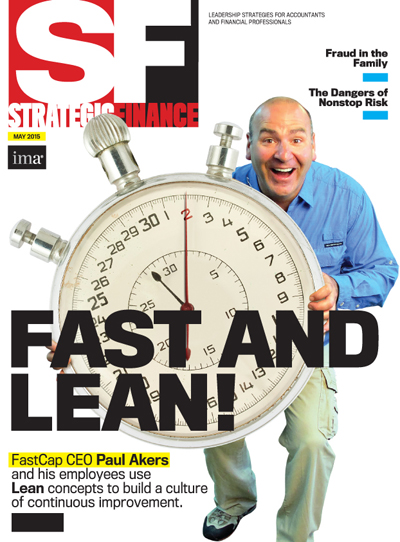At the World Congress of Accountants in Rome, Italy, last November, IMA® and ACCA (Association of Chartered Certified Accountants) presented a session on Digital Darwinism, the phenomenon of rapidly changing technology and the challenges the accounting profession faces to adapt to the changes. Technology is transforming the role of management accountants in managing and analyzing information. The transformation, driven by expanding technological capability, is automating the processing, analysis, and consumption of information, creating higher demand for real-time data and elevating the role of business intelligence in organizations. Management accountants must raise their technical intelligence to assist in developing technology strategies and implementing risk-based technology controls in their organizations.
EMERGING TECHNOLOGY CHALLENGES
Liv Watson, director of new markets at Workiva and a member of IMA’s Technology Solutions & Practices (TS&P) Committee, identified three major technology challenges for management accountants: (1) using cloud-based collaboration, (2) cybersecurity, and (3) risk management and data governance. Because documents are increasingly moving to the cloud, changing the structure of workflow processes is necessary to facilitate workplace collaboration.
Collaboration improves business performance by allowing teams to access work documents from any location and from almost any platform. Configuration control is critical for collaboration to ensure that activities and documents are in sync and that the whole team is working on the latest version. Management accountants should educate their companies about the power and value of collaboration tools for their businesses and on the necessary controls.
Cybersecurity data breaches have been widely reported in the press for the past few years, including breaches at Target, UPS, Neiman Marcus, and JPMorgan Chase. Companies that fail to safeguard data jeopardize their customer base, risk severe damage to their reputations, and face expensive lawsuits. Responsibility for securing data goes beyond the IT department and requires management accountants to get involved in implementing and monitoring data protection and privacy internal controls.
Data governance and risk management must be addressed at the enterprise level to ensure that a single authoritative source is defined and discoverable/searchable, is given context, and is under version control to ensure that the latest data is used. Companies must create and manage a data traffic control system to provide structure and internal controls for data updates, management, access, and security. Management accountants should participate in this process because they understand the accounting and business context of their companies’ data. For example, if a controller needs a product costing analysis to develop a new product price list, management accountants can identify the relevant cost information necessary to perform the analysis.
Data governance at the board of directors level is also an emerging issue—probably in part because of the data breaches mentioned previously. A recent survey by the National Association of Corporate Directors, “2014-2015 NACD Public Company Governance Survey,” found that 40% of survey respondents were unhappy with the quality of their company’s IT strategy and the information provided by their IT department. FedEx Corp. even created a board committee—the Information Technology Oversight Committee—that addresses logistics issues in the air and freight delivery industry and internal technology infrastructure issues.
HOW TO RAISE TECHNICAL INTELLIGENCE
In a recent survey, Mike Lovelace, a TS&P Committee member, offered great advice on how to raise technical intelligence: “We don’t have to become geniuses in all-things-tech. Just become familiar with what’s going on in the tech space.” And Barry Nathan, another TS&P Committee member, said: “By reading about the trends and how to utilize the technology, you will understand what does or does not work for your organization. You also will know what’s being hyped and what isn’t.”
IMA provides outstanding resources to help raise technical intelligence, including Strategic Finance’s monthly Technology Workbook columns and its semimonthly SF TechNotes newsletter, technology webinars presented by IMA’s Inside Talk series, sessions at IMA’s Annual Conference & Expo, and IMA chapter meetings. And the TS&P Committee hosts a blog for knowledge sharing on LinkUp IMA.
TS&P Committee members recommend focusing on technology education by attending Continuing Professional Education (CPE) sessions, taking college courses, enrolling in a technology degree program, and/or participating in companies’ software training programs. Also, be proactive and volunteer to work with the IT department on projects, such as setting up personal databases and analysis on a desktop database program. YouTube videos and TED Talks—online video repositories with presentations and lectures on various topics—are also excellent sources of timely tech topics.
WILL YOU BE READY?
Digital Darwinism is here to stay. Management accountants who are agile, forward-looking, decisive, and have high technology intelligence will survive. Jeff Thomson, IMA president and CEO, believes that management accountants and organizations need to embrace technology. He says that “Those who miss the window of opportunity risk becoming casualties of ‘Digital Darwinism.’” Management accountants: Raise your technical intelligence. Will you be successful, or will you be a casualty?
Sidebar: THE CASE FOR RAISING TECHNICAL INTELLIGENCE
A survey of IMA’s TS&P Committee, represented by tech-savvy management accountants and IT professionals, provides insight into the importance of raising technical intelligence. Respondents identified the following reasons:
Produces Reliable and Accurate Information: “Technology knowledge is critical for management accountants to understand and to provide assurance that modern information systems are providing accurate information to their organizational leaders. The expansion of dashboards, data analysis, and other tools that management increasingly relies on creates risk for organizations: The information appears reliable but may be incorrect. Management accountants’ skills are needed to assess that this information is indeed reliable.”—Glenn Murphy
Improves Productivity: “Business and organizations in general will always look to technology to improve productivity (so ignoring these trends and techniques will put management accountants at a significant disadvantage).”—Chris Mischler
Overcomes SME Challenges: “In an SME, management accountants need to understand the basics of technology and what needs to be done to ensure confidentiality, accuracy, and ability to use the systems. They need to understand what the technology is doing and how to make it work for their organization.”—Barry Nathan

May 2015



